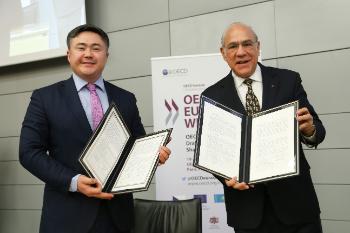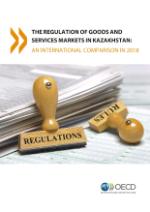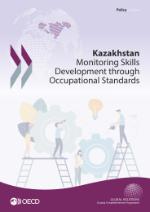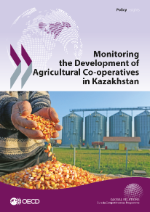Kazakhstan and the OECD
A GROWING PARTNERSHIP
 Kazakhstan Minister of National Economy, Mr. Timur Suleimenov (left) and OECD Secretary General, Angel Gurría (right) signed a new Memorandum of Understanding on 21 November 2018 at Eurasia Week, in Paris, France. Kazakhstan Minister of National Economy, Mr. Timur Suleimenov (left) and OECD Secretary General, Angel Gurría (right) signed a new Memorandum of Understanding on 21 November 2018 at Eurasia Week, in Paris, France. |
Latest news: 21 November 2018 On the final day of Eurasia Week 2018, the OECD Secretary-General Angel Gurría and Kazakhstan’s Minister of National Economy, Mr. Timur Suleimenov, signed a new Memorandum of Understanding between the OECD and Kazakhstan, which will provide a framework for co-operation over the years to come.
In January 2015, the OECD and Kazakhstan embarked on a two-year programme of structured co-operation, the OECD Kazakhstan Country Programme, which supported Kazakhstan’s reform efforts across a wide range of policy domains. The Country Programme was extended until the end of 2018. It has provided the framework for carrying out several dozen OECD projects with the country and has provided an opportunity for Kazakhstan to increase its participation in a number of OECD committees and their subsidiary bodies. Kazakhstan has also adhered to a growing number of OECD instruments under the Programme. The new agreement, which runs until end-2022, provides a framework for further co-operation and reflects the commitment of both the OECD and Kazakhstan to build on the success of the Country Programme. |
THE COUNTRY PROGRAMME & BEYOND
Under the Country Programme, the OECD and Kazakhstan have worked together to advance Kazakhstan’s reforms in order to combine sustained economic growth with social inclusion, strengthen competitiveness and diversify the domestic economy, increase the effectiveness of public institutions, and achieve better environmental outcomes. Additionally, the Programme has provided a framework for promoting OECD standards in the wider Central Asia region, which has been an explicit aim of the Country Programme from its inception.
In view of this progress and building on this continuous relationship, the OECD and Kazakhstan signed a new Memorandum of Understanding (MoU) to structure their co-operation over the next years.
The MoU will provide Kazakhstan and the OECD with a framework for their work together on a wide range of policy challenges, including, among many others:
- public governance and anti-corruption
- green growth and environment policy
- fiscal affairs
- health, employment and social inclusion
- education and skills
- competitiveness, investment and business climate
- trade
- competition, state ownership and privatisations.
Latest OECD Publications on Kazakhstan
 |
The Regulation of Goods and Services Markets in Kazakhstan: An International Comparison 2018 This report presents the first-ever results from the application of the OECD’s economy-wide product market regulation (PMR) indicators to Kazakhstan. It finds that that regulations in Kazakhstan are less conducive to competition than the OECD average, although Kazakhstan’s overall ranking is similar to, or even slightly better than, those of such emerging-market economies as Argentina, Brazil and South Africa. The report also explores important differences across sectors of economic activity, identifying the principal barriers and bottlenecks that must be addressed in order to create a competition-friendly economic environment. Extensive direct state control over enterprises presents significant challenges, particularly in view of evidence of weak public governance of state-owned enterprises. Trade facilitation and differential treatment of foreign suppliers are also problems, and there is considerable room for improvement in the regulation of infrastructure sectors like electronic communications, air and water transport and electricity. By contrast, Kazakhstan scores fairly well with respect to administrative burdens on start-ups and in the regulation of retail distribution, natural gas, road and rail transport, and most professional services. The report highlights the scope for sectoral regulatory reforms that could strengthen competition, thereby stimulating innovation and productivity growth, as well as bringing benefits to consumers. |
|
Kazakhstan: Monitoring Skills Development through Occupational Standards (2019) This Policy Insights report reviews Kazakhstan’s progress in developing and implementing OS since the recommendations made in the 2015 OECD peer review note. It assesses Kazakhstan’s achievements in improving the institutional setting and capacity for the development of OS.It also looks at work to implement OS in VET curricula, and the initiatives to promote their use. The report makes recommendations to increase institutional expertise concerning OS, and to create more effective implementation and monitoring mechanisms. |
|
|
Monitoring the Development of Agricultural Co-operatives in Kazakhstan (2019) This report monitors progress in implementing the three main policy recommendations from the OECD policy handbook Strengthening Agricultural Co-operatives in Kazakhstan (2015). It covers the legal frameworks for agricultural co-operatives, education and information services, and financial support programmes, and concludes with a series of targeted recommendations for future activities. The report was developed in close collaboration with the Ministry of Agriculture, KazAgro Holding, subnational authorities, farmers, farmers’ associations, research institutes and a team of international experts. |
Key Publications
- Risk Governance Scan of Kazakhstan
- Addressing Industrial Air Pollution in Kazakhstan: Reforming Environmental Payments Policy Guidelines (2019) English | Russian
- SME and Entrepreneurship Policy in Kazakhstan 2018 – part of the KCP
- Global Forum on Transparency and Exchange of Information for Tax Purposes: Kazakhstan 2018 (Second Round) : Peer Review Report on the Exchange of Information on Request
- Benchmarking Civil Service Reform in Kazakhstan (2018)
- Strengthening Shardara Multi-Purpose Water Infrastructure in Kazakhstan (2018) English | Russian
- National Health Accounts of Kazakhstan (2018)
- OECD Reviews of Health Systems: Kazakhstan 2018
- Decentralisation and Multi-level Governance in Kazakhstan (2018)
Participation in OECD Bodies
Kazakhstan participates in the work of many OECD Committees, Working Parties and other bodies, including actively in a dozen of them. For instance, the country has become a Participant in the Competition Committee (2016), the Committee on Statistics and Statistical Policy (2016), and the Working Party on State Ownership and Privatisation Practices (2016), and an Associate in the Investment Committee(for the work related to the Declaration). It has also joined the OECD’s Base Erosion and Profit-Shifting (BEPS) Project (2016), an initiative involving over 100 countries in an effort to tackle tax avoidance strategies that exploit gaps and mismatches in tax rules to artificially shift profits to low or no-tax locations.
Kazakhstan participates in numerous other OECD activities and projects, including:
Statistics from Kazakhstan are also gathered in OECD platforms including:
Additional Forms of Engagement
From 2012 to 2016, Kazakhstan served as co-chair of the OECD Eurasia Competitiveness Programme’s Central Asia Initiative. In 2017, it became the first country in the region to host the OECD Eurasia Week, a ministerial-level event that serves as a platform for a discussion on a broad spectrum of thematic issues relevant to further improving the region’s competitiveness.
Key Events and Meetings
- OECD Eurasia Week 2018: Drawing the Lessons, Shaping the Future, Paris, France, 19-21 November 2018
- OECD Eurasia Week 2017: Openness for Shared Prosperity, Almaty, Kazakhstan, 23-25 October 2017
- OECD Day at EXPO 2017, Astana, Kazakhstan, 11 July 2017 English | Pусский
- OECD Ministerial Council Meeting (MCM), Paris France, 7-8 June 2017
- Bilateral meeting between OECD Secretary General, Mr. Angel Gurría and Prime Minister of Kazakhstan, Mr. Karim Massimov, Davos, Switzerland, 22 January, 2015
» For more on OECD work with Kazakhstan
Documents connexes



